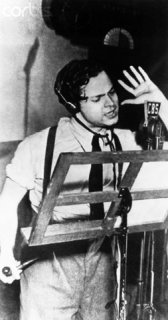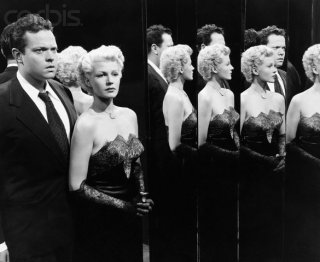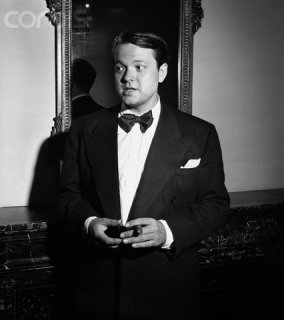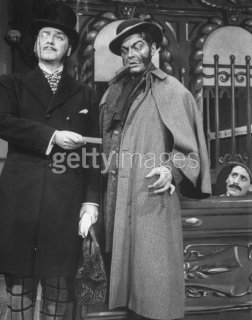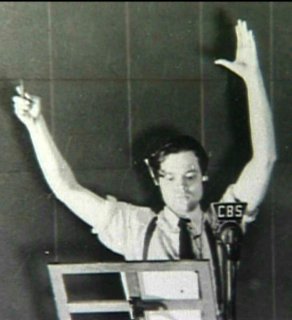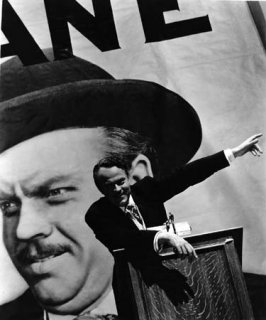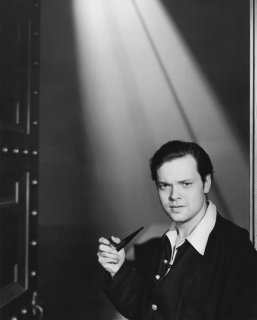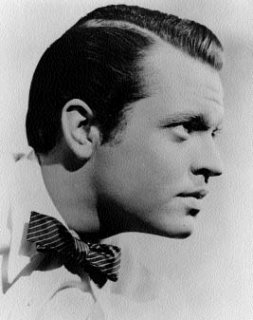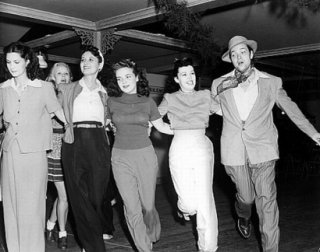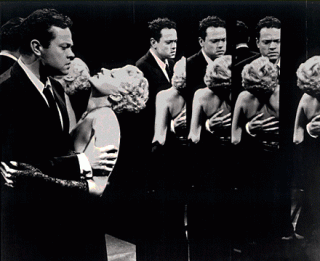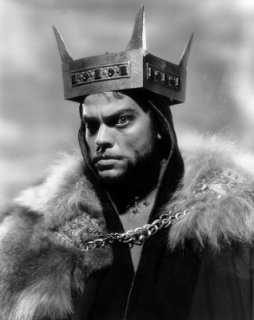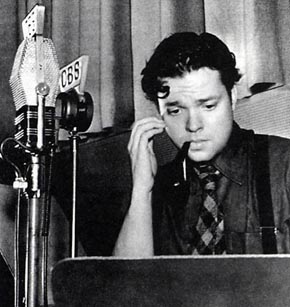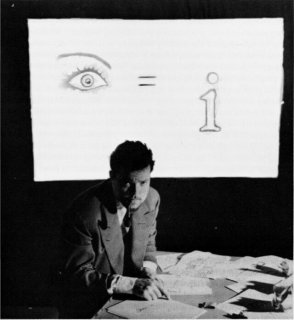A true genius and such a unique person
Wikipedia
George Orson Welles (May 6, 1915 – October 10, 1985) was an Academy Award-winning American director, writer, actor and producer for film, stage, radio and television. Welles was also an accomplished magician, starring in troop variety spectacles in the war years. During this period he became a political activist and commentator through journalism, radio and public appearances with political figures.
Noted for his innovative dramatic productions as well as his distinctive voice and personality, Welles is widely acknowledged as one of the most accomplished dramatic artists of the 20th century. In 2002 he was voted as the greatest film director of all time in the British Film Institute's poll of Top Ten Directors

Welles was born May 6, 1915, in Kenosha, Wisconsin. Despite his parents' affluence, Welles encountered many hardships in childhood. In 1919, his parents separated and moved to Chicago, and his father became an alcoholic and stopped working. Welles's mother died of jaundice on May 10, 1924, in a Chicago hospital, four days after Welles's ninth birthday. After his mother's death, Welles ceased pursuing his interest in music. Richard Welles died when Orson was 15, the summer after Orson's graduation from the Todd School for Boys in Woodstock, Illinois.
Maurice Bernstein became his guardian. Born in Russia, he came to Chicago in 1890, studied and became a successful physician. In a very few years, he had several wives, including the Chicago Lyric Opera soprano, Edith Mason. Edith divorced company director Giorgio Polacco to marry Bernstein. Not long thereafter, they divorced and she remarried Polacco.
At Todd, Welles came under the positive influence and guidance of Roger Hill, a teacher who later became Todd's headmaster. Hill provided Welles with an 'ad hoc' educational environment that proved invaluable to his creative experience, allowing Welles to concentrate on subjects that interested him. Welles performed and staged his first theatrical experiments and productions there.
On his father's death, Welles traveled to Europe with the aid of a small inheritance. While on a walking and painting trip through Ireland, he strode into the Gate Theatre in Dublin and claimed he was a Broadway star. Gate manager Hilton Edwards later claimed he didn't believe him but was impressed by his brashness and some impassioned quality in his audition. Welles made his stage debut at the Gate in 1931, appearing in Jew Suss as the Duke. He acted to great acclaim, acclaim that reached the United States. He performed smaller supporting roles as well. On returning to the United States he found his brief fame ephemeral and turned to a writing project at Todd that would become the immensely successful Everybody's Shakespeare, and subsequently, The Mercury Shakespeare. Welles traveled to North Africa while working on thousands of illustrations for the Everybody's Shakespeare series of educational books, a series that remained in print for decades.
An introduction by Thornton Wilder led Welles to the New York stage. He toured in three off-Broadway productions with Katharine Cornell's company. Restless and impatient when the planned Broadway opening of Romeo and Juliet was canceled, Welles staged a drama festival of his own with the Todd School, inviting Micheál MacLiammóir and Hilton Edwards from Dublin's Gate Theatre to appear, along with New York stage luminaries. It was a roaring success. The subsequent revival of Romeo and Juliet brought Welles to the notice of John Houseman, who was then casting for an unusual lead actor and about to take a lead role in the Federal Theatre Project.
By 1935 Welles was supplementing his earnings in the theater as a radio actor in New York City, working with many of the actors who would later form the core of his Mercury Theatre. He married actress and socialite Virginia Nicholson in 1934. They had one daughter, Christopher, who became known as Chris Welles Feder, an author of educational materials for children. Welles also shot an eight-minute silent short film, The Hearts of Age with Nicholson.
In 1936, the Federal Theatre Project (part of Roosevelt's Works Progress Administration) put unemployed theatre performers and employees to work. Welles was hired by John Houseman and assigned to direct a project for Harlem's American Negro Theater. He offered them Macbeth, set the production in the Haitian court of King Henri Christophe (and with voodoo witch doctors for the three Weird Sisters). Jack Carter played Macbeth. The play was rapturously received and later toured the nation. At the age of 20, Welles was hailed as a prodigy.
After the success of Macbeth, Welles mounted the absurd farce Horse Eats Hat. He consolidated his "White Hope" reputation with Dr Faustus. This was even more ground-breaking theatre than Macbeth, using light as a prime unifying scenic element in a nearly blacked-out stage. In 1937, he rehearsed Marc Blitzstein's pro-union "labour opera" The Cradle Will Rock. Because of severe federal cutbacks and perhaps rumoured Congressional worries about communist propaganda in the Federal Theatre, the show's premiere at the Maxine Elliott Theatre was cancelled and the theatre locked and guarded by National Guardsmen. In a last-minute theatrical coup Welles announced to waiting ticket-holders that the show was being transferred to the Venice, about twenty blocks away. Cast, crew and audience walked the distance on foot. Since the unions forbade the actors and musicians performing from the stage, The Cradle Will Rock began with Blitzstein introducing the show and playing the piano accompaniment on stage, with the cast performing their parts from the audience. This impromptu performance was a tremendous hit.
Resigning from the Federal Theatre, Welles and Houseman formed their own company, the Mercury Theatre, which included actors such as Agnes Moorehead, Joseph Cotten, Ray Collins, George Coulouris, Frank Readick, Everett Sloane, Eustace Wyatt and Erskine Sanford, all of whom would continue to work for Welles for years. The first Mercury Theatre production was a melodramatic and heavily edited version of Shakespeare's Julius Caesar, set in a contemporary frame of fascist Italy. Cinna the Poet dies at the hands not of a mob but a secret police force. According to Norman Lloyd, who played Cinna, "it stopped the show". The applause lasted more than 3 minutes and the production was widely acclaimed.
Welles was increasingly active on radio, as an actor and soon as a director and producer. He played Hamlet for CBS on The Columbia Workshop, adapting and directing the play himself. The Mutual Network gave him a seven-week series to adapt Les Misérables, which he did with great success. Welles was chosen to anonymously play Lamont Cranston, The Shadow, in late 1937 (again for Mutual) and in the summer of 1938 CBS gave him (and the Mercury Theatre) a weekly hour-long show to broadcast radio plays based on classic literary works. The show was titled The Mercury Theatre on the Air, with original music by Bernard Herrmann, who would continue working with Welles on radio and in films for years.
Their October 30 broadcast, H. G. Wells's The War of the Worlds, brought Welles notoriety and instant fame on both a national and international level. The fortuitous mixture of news bulletin format with the between-breaks dial spinning habits of listeners from the rival and far more popular Edgar Bergen/Charlie McCarthy program, created widespread confusion among late tuners. Panic spread among many listeners who believed the news reports of an actual Martian invasion. The resulting panic was duly reported around the world and disparagingly mentioned by Adolf Hitler in a public speech a few months later.[3] Welles's growing fame soon drew Hollywood offers, lures which the independent-minded Welles resisted at first. However, The Mercury Theatre on the Air, which had been a "sustaining show" (without sponsorship) was picked up by Campbell Soup and renamed The Campbell Playhouse.
Welles in Hollywood (1939 to 1948)
RKO Pictures president George Schaefer eventually offered Welles what is generally considered the greatest contract ever offered to an untried director: complete artistic control. RKO signed Welles in a two-picture deal; including script, cast, crew, and most important, final cut, though Welles had a budget limit for his projects. With this contract in hand, Welles (and nearly the entire Mercury Theatre) moved to Hollywood. He commuted weekly to New York to maintain his The Campbell Playhouse commitment.
Welles toyed with various ideas for his first project for RKO Pictures, settling on an adaptation of Joseph Conrad's Heart of Darkness, which he worked on in great detail. He planned to film the action with a subjective camera from the protagonist's point of view
Wikipedia
George Orson Welles (May 6, 1915 – October 10, 1985) was an Academy Award-winning American director, writer, actor and producer for film, stage, radio and television. Welles was also an accomplished magician, starring in troop variety spectacles in the war years. During this period he became a political activist and commentator through journalism, radio and public appearances with political figures.
Noted for his innovative dramatic productions as well as his distinctive voice and personality, Welles is widely acknowledged as one of the most accomplished dramatic artists of the 20th century. In 2002 he was voted as the greatest film director of all time in the British Film Institute's poll of Top Ten Directors

Welles was born May 6, 1915, in Kenosha, Wisconsin. Despite his parents' affluence, Welles encountered many hardships in childhood. In 1919, his parents separated and moved to Chicago, and his father became an alcoholic and stopped working. Welles's mother died of jaundice on May 10, 1924, in a Chicago hospital, four days after Welles's ninth birthday. After his mother's death, Welles ceased pursuing his interest in music. Richard Welles died when Orson was 15, the summer after Orson's graduation from the Todd School for Boys in Woodstock, Illinois.
Maurice Bernstein became his guardian. Born in Russia, he came to Chicago in 1890, studied and became a successful physician. In a very few years, he had several wives, including the Chicago Lyric Opera soprano, Edith Mason. Edith divorced company director Giorgio Polacco to marry Bernstein. Not long thereafter, they divorced and she remarried Polacco.
At Todd, Welles came under the positive influence and guidance of Roger Hill, a teacher who later became Todd's headmaster. Hill provided Welles with an 'ad hoc' educational environment that proved invaluable to his creative experience, allowing Welles to concentrate on subjects that interested him. Welles performed and staged his first theatrical experiments and productions there.
On his father's death, Welles traveled to Europe with the aid of a small inheritance. While on a walking and painting trip through Ireland, he strode into the Gate Theatre in Dublin and claimed he was a Broadway star. Gate manager Hilton Edwards later claimed he didn't believe him but was impressed by his brashness and some impassioned quality in his audition. Welles made his stage debut at the Gate in 1931, appearing in Jew Suss as the Duke. He acted to great acclaim, acclaim that reached the United States. He performed smaller supporting roles as well. On returning to the United States he found his brief fame ephemeral and turned to a writing project at Todd that would become the immensely successful Everybody's Shakespeare, and subsequently, The Mercury Shakespeare. Welles traveled to North Africa while working on thousands of illustrations for the Everybody's Shakespeare series of educational books, a series that remained in print for decades.
An introduction by Thornton Wilder led Welles to the New York stage. He toured in three off-Broadway productions with Katharine Cornell's company. Restless and impatient when the planned Broadway opening of Romeo and Juliet was canceled, Welles staged a drama festival of his own with the Todd School, inviting Micheál MacLiammóir and Hilton Edwards from Dublin's Gate Theatre to appear, along with New York stage luminaries. It was a roaring success. The subsequent revival of Romeo and Juliet brought Welles to the notice of John Houseman, who was then casting for an unusual lead actor and about to take a lead role in the Federal Theatre Project.
By 1935 Welles was supplementing his earnings in the theater as a radio actor in New York City, working with many of the actors who would later form the core of his Mercury Theatre. He married actress and socialite Virginia Nicholson in 1934. They had one daughter, Christopher, who became known as Chris Welles Feder, an author of educational materials for children. Welles also shot an eight-minute silent short film, The Hearts of Age with Nicholson.
In 1936, the Federal Theatre Project (part of Roosevelt's Works Progress Administration) put unemployed theatre performers and employees to work. Welles was hired by John Houseman and assigned to direct a project for Harlem's American Negro Theater. He offered them Macbeth, set the production in the Haitian court of King Henri Christophe (and with voodoo witch doctors for the three Weird Sisters). Jack Carter played Macbeth. The play was rapturously received and later toured the nation. At the age of 20, Welles was hailed as a prodigy.
After the success of Macbeth, Welles mounted the absurd farce Horse Eats Hat. He consolidated his "White Hope" reputation with Dr Faustus. This was even more ground-breaking theatre than Macbeth, using light as a prime unifying scenic element in a nearly blacked-out stage. In 1937, he rehearsed Marc Blitzstein's pro-union "labour opera" The Cradle Will Rock. Because of severe federal cutbacks and perhaps rumoured Congressional worries about communist propaganda in the Federal Theatre, the show's premiere at the Maxine Elliott Theatre was cancelled and the theatre locked and guarded by National Guardsmen. In a last-minute theatrical coup Welles announced to waiting ticket-holders that the show was being transferred to the Venice, about twenty blocks away. Cast, crew and audience walked the distance on foot. Since the unions forbade the actors and musicians performing from the stage, The Cradle Will Rock began with Blitzstein introducing the show and playing the piano accompaniment on stage, with the cast performing their parts from the audience. This impromptu performance was a tremendous hit.
Resigning from the Federal Theatre, Welles and Houseman formed their own company, the Mercury Theatre, which included actors such as Agnes Moorehead, Joseph Cotten, Ray Collins, George Coulouris, Frank Readick, Everett Sloane, Eustace Wyatt and Erskine Sanford, all of whom would continue to work for Welles for years. The first Mercury Theatre production was a melodramatic and heavily edited version of Shakespeare's Julius Caesar, set in a contemporary frame of fascist Italy. Cinna the Poet dies at the hands not of a mob but a secret police force. According to Norman Lloyd, who played Cinna, "it stopped the show". The applause lasted more than 3 minutes and the production was widely acclaimed.
Welles was increasingly active on radio, as an actor and soon as a director and producer. He played Hamlet for CBS on The Columbia Workshop, adapting and directing the play himself. The Mutual Network gave him a seven-week series to adapt Les Misérables, which he did with great success. Welles was chosen to anonymously play Lamont Cranston, The Shadow, in late 1937 (again for Mutual) and in the summer of 1938 CBS gave him (and the Mercury Theatre) a weekly hour-long show to broadcast radio plays based on classic literary works. The show was titled The Mercury Theatre on the Air, with original music by Bernard Herrmann, who would continue working with Welles on radio and in films for years.
Their October 30 broadcast, H. G. Wells's The War of the Worlds, brought Welles notoriety and instant fame on both a national and international level. The fortuitous mixture of news bulletin format with the between-breaks dial spinning habits of listeners from the rival and far more popular Edgar Bergen/Charlie McCarthy program, created widespread confusion among late tuners. Panic spread among many listeners who believed the news reports of an actual Martian invasion. The resulting panic was duly reported around the world and disparagingly mentioned by Adolf Hitler in a public speech a few months later.[3] Welles's growing fame soon drew Hollywood offers, lures which the independent-minded Welles resisted at first. However, The Mercury Theatre on the Air, which had been a "sustaining show" (without sponsorship) was picked up by Campbell Soup and renamed The Campbell Playhouse.
Welles in Hollywood (1939 to 1948)
RKO Pictures president George Schaefer eventually offered Welles what is generally considered the greatest contract ever offered to an untried director: complete artistic control. RKO signed Welles in a two-picture deal; including script, cast, crew, and most important, final cut, though Welles had a budget limit for his projects. With this contract in hand, Welles (and nearly the entire Mercury Theatre) moved to Hollywood. He commuted weekly to New York to maintain his The Campbell Playhouse commitment.
Welles toyed with various ideas for his first project for RKO Pictures, settling on an adaptation of Joseph Conrad's Heart of Darkness, which he worked on in great detail. He planned to film the action with a subjective camera from the protagonist's point of view





